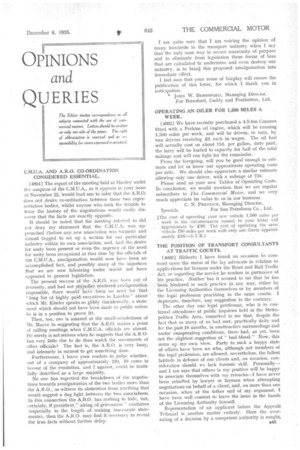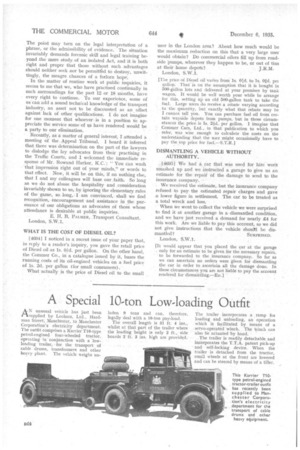OPINIONS and
Page 57

Page 58

If you've noticed an error in this article please click here to report it so we can fix it.
QUERIES
C.M.U.A. AND A.R.O. CO-ORDINATION CONSIDERED ESSENTIAL.
[4691] The report of the meeting held at Hanley under the auspices of the C.M.U.A., as it appears in your issue of November 22, 'would lead one to infer that the A.R.O. does not desire co-ordination between these two representative bodies, whilst anyone who took the trouble to trace the history of the negotiations would easily discover that the facts are exactly opposite.
It should be noted that the meeting referred to did
not deny my statement that the was approached (before any new association was formed) and almost begged to set up a section for our particular industry within its own association, and, had the desire for unity been present or even the urgency of the need for unity been recognized at that time by the officials of the C.M.U.A., amalgamation would now have been an accomplished fact, and possibly many of the injustices that we are now labouring under would not have appeared in present legislation.
The present success of the A.R.O. was born out of necessity, and. had not prejtidice rendered annilgarnation impossible, there would haVe been no need for that "long list of highly paid executives in London" about which Mr. Kinder speaks so glibly (incidentally, a statement which should not have been made in public unless he is in a position to prove it).
Then, too, one is amazed at the small-mindedness of Mr. Macve in suggesting that the A.R.O. makes a point of calling meetings when C.M.U.A. officials are absent. He surely is not serious when he suggests that the A.R.O. has very little else to do than watch the movements of other officials? The fact is, the A.R.O. is very busy, and intensely in earnest to get something done.
Furthermore, I leave your readers to judge whether, out of a company of approximately 13(1, 10 votes in favour, of the resolution, and 7 against, could be truthfully described as a large majority.
No one has regretted the breakdown of the negotiations towards amalgamation of the two bodies more than the A.R.O., as witness its abstention from anything that would suggest a dog fight between the two associations. In this connection the A.R.O. has nothing to hide, but, certainly, if persistent " airing of grievances " continues (especially to the length of making inaccurate statements), then the .A.R.O. may .find it necessary to reveal the true facts without further delay. I am quite sure that I am voicing the opinion of many hundreds in the transport industry when I say that the only sane way to secure unanimity of purpose and to eliminate from legislation those forms of bias that are calculated to undermine and even destroy our industry, is to bring this proposed amalgamation into immediate effect.
I feel sure that your sense of fairplay will ensure the publication of, this letter, for which I thank you in anticipation.
jonx, W. BERESFORD, Managing Director. For Beresford, Caddy and. Pemberton, Ltd.
OPERATING AN OILER FOR 1,500 MILES A WEEK.
[46921 We have recently purchased a 4-5-ton Comma fitted with a Perkins oil engine, which will be running 1,500 miles per week, and will be driven, in turn, by two drivers receiving £3 each in wages. The oil fuel will actually cost us about lid, per gallon, duty paid, the lorry will be loaded to capacity for half of the total mileage and will run light for the remainder.
From the foregoing, will you be good enough to estimate and let us know our approximate operating costs per mile. We should also appreciate a similar estimate allowing only one driver, with a mileage of 750.
Please send us your new Tables of Operating Costs. In .conclusion, we would mention that we are regular subscribers to The Commercial Motor, and we very much appreciate its value to us in our business.
C-. N. PRENTICE, Managing Director,
Ipswich. For Sun Petroleum Co., Ltd.
[The, cost of operating your new vehicle 1,500 miles per _ week in the circumstances named in your letter will approximate to AM}, " The cOit of operating the same vehicle 750 miles per week With only one driver approximately £16.--S.T.R.1 THE POSITION OF TRANSPORT CONSULTANTS AT TRAFFIC COURTS.
[4093] Hitherto I have found no occasion to comment upon the status of the lay advocate in relation to applications for licences under the Road and Rail Traffic Act, or regarding the service he renders in pursuance of his practice. Neither has it seemed to me that he has been hindered in such practice in an way, either by the Licensing Authorities themselves or by members of the legal profession practising in the same courts. I deprecate, therefore, any suggestion to the contrary.
The other day one legal gentleman, who is in con tinual attendance at public inquiries held in the Metropolitan Traffic Area, remarked to me that, despite the fact that so many of us had met, practically daily and for the past 18 months, in unattractive surroundings and under exasperating conditions, there had, as yet, been not the slightest suggestion of "bad blood." Now, this sums up my own view. Party to, such a happy state of affairs have been we who, although not members of the legal profession, are allowed, nevertheless, the fullest latitude in defence of our clients and, on occasion, consideration should we lack forensic skill. Personally— and I am sure that others in my position will be happy to associate themselves with my remarks—I have never been rebuffed by lawyer or layman when attempting negotiations on behalf of a client, and, on snore than one occasion, when at the tether end of my argument, I have been well content to leave the issue in the hands of the Licensing Authority himself.
Representation of an applicant before the Appeals Tribunal is another matter entirely. Here the overruling of a decision by a competent authority is sought, B43 The point may turn on the legal interpretation of a phrase, or the admissibility of evidence. The situation invariably demands forensic skill and legal training be.yond the mere study of an isolated Act, and it is both right and proper that those without such advantages should neither seek nor be permitted to destroy, unwittingly, the meagre chances of a forlorn hope'.
In the matter of routine work at public inquiries, it seems to me that we, who have practised continually in such surroundings for the past 12 or 18 months, have every right to continue. To our experience, some of us can add a sound technical knowledge of the transport industry, an asset not to be discounted as an offset• against lack of other qualifications. I do not imagine for one moment that whoever is in a position to appreciate the service some of us have rendered would be a party to our elimination.
RecentlY, as a matter of general interest, I attended a. meeting of the Appeal Tribunal. I heard it inferred that there was determination on the part of the lawyers to dislodge the lay advocates from their practising in the Traffic Courts, and I welcomed the immediate re
sponse of Mr. Rowand. Harker, "You can wash that impression right out of your minds," or words to that effect. Now, it will be on this, if on nothing else, that I and my colleagues will base our. faith. So long as we do not abuse the hospitality and consideration invariably shown to us, by ignoring the elementary rules of thegame, so long,. I I am convinced, • shall we find recognition, encouragement and assistance in the pursuance of our obligations as advocates .of those whose attendance is desirable at public inquiries.
E. H. B. PALMER, .Transport Consultant. London, S.W.1, WHAT IS THE COST OF DIESEL OIL?
[4694] I noticed in a recent issue of your paper that, in reply to a reader's inquiry, you gave the retail price of Diesel oil as 1s. 0,1d. per gallon. On the other hand, the Commer Co., in a catalogue issued by it, bases the running costs of its oil-engined vehicles on a fuel price of is. 2d. per gallon (for small consumers).
What actually is the price of Diesel oil to the small user in the London area? About how much would be the maximum reduction on this that a very large user would obtain? Do commercial oilers fill up from roadside pumps, wherever they happen to be, or out of tins at their home depots? J .R . M. London, S.W.1.
[The price of Diesel oil varies from 1s. Old. to is. Old. per gallon. That is on the assumption that it is bought in 500-gallon lots and delivered at your premises by tank wagon. It would be well worth your while to arrange for this, setting up an old 500-gallon tank to take the fuel. Large users do receive a rebate varying according to the quantity, but exactly what that rebate may be I cannot tell you. You can purchase fuel oil from certain wayside depots from pumps, but in those circumstances the price is is. 24d. per gallon. I imagine that Comrner Cars, Ltd., in that publication to which you refer, was wise enough to calculate the costs on the understanding that the user might occasionally have to pay the top price for fuel.—S.T.R,J DISMANTLING A VEHICLE WITHOUT AUTHORITY.
14695] We had a car that was used for hire work smashed up and we instructed a garage to give us an estimate for the repaii of the damage to send to the insurance company.
We received the estimate, but the insurance company refused to pay the estimated repair charges and gave .a lower figure in settlement. The car to be treated as a total wreck and loss.
When we went to collect the vehicle we were surprised to find it at another garage in a dismantled condition, and we have just received a demand for nearly £4 for this work. Are we liable to pay this account, as we did not give instructions that the vehicle shoultl be dis
mantled? SURPRISED. London, S.W.1.
[It would appear that you placed the car at the garage . only for an estimate to be given for the necessary repairs, to be forwarded to the insurance company. So far as we can ascertain no orders were given for dismantling the car in order to ascertain all the damage done. In these circumstances you are not liable to pay the account rendered for dismantling.—ED.J




























































































